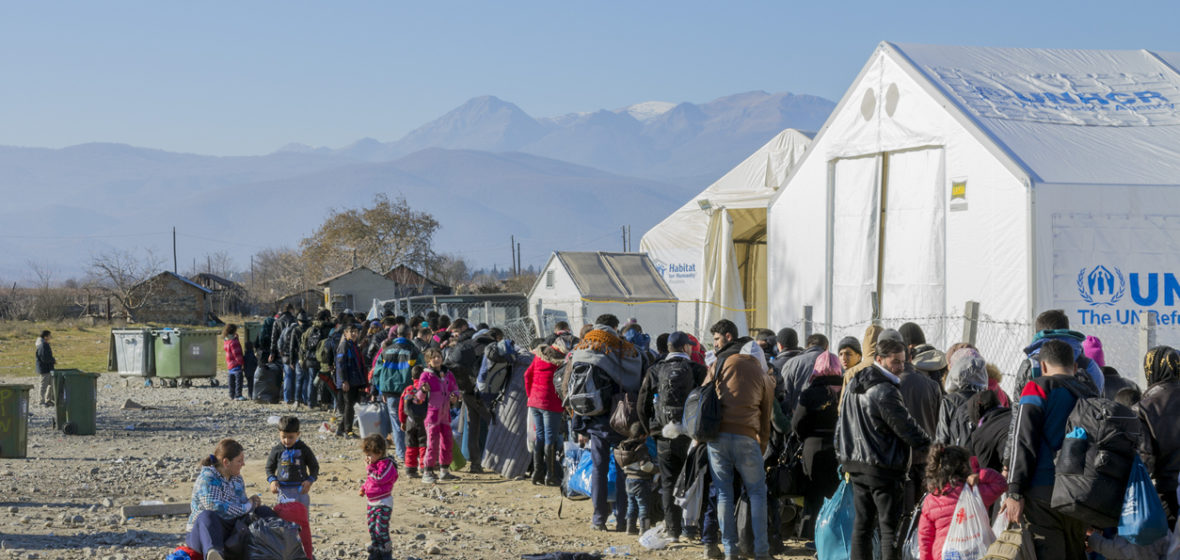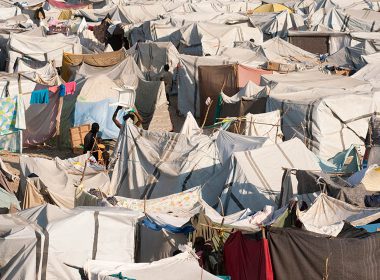International human rights investigations don't pause for a pandemic. As national borders remain shut, technology is being used to bridge the oceans where planes cannot.
Interviewing witnesses is a fundamental part of human rights investigations and fact-finding missions. Witness testimony is not simply an essential evidentiary source. Giving voice to survivors is also an important tool for accountability and justice.
But how can witnesses be effectively, safely and ethically engaged in fact-finding processes when in-person contact is impossible? These issues are not new, but the COVID-19 pandemic and associated restrictions on travel and personal contact have created new challenges surrounding access to witnesses.
Access denied
Prior to the COVID-19 pandemic, investigators in restricted access contexts were able to conduct in-person interviews with witnesses outside the country or area under investigation, including refugees, asylum seekers and foreign professionals such as journalists. However, due to COVID-related health risks and travel restrictions, in-person interviews with these witness groups are rarely possible.
More than two-thirds of recent investigations established by the United Nations have been denied access to the relevant country, or have faced significant access restrictions. Similarly, non-government organisations (NGOs) are increasingly being prevented from accessing war zones, or are unable to move freely around a country to investigate potential war crimes and human rights abuses.
Previously, access was denied primarily for political or security reasons. For example, when the regime under investigation was still in power, authorities would rarely allow international investigators to enter their territory. In the last 20 months, COVID-19 has created additional access barriers, preventing investigators from meeting face-to-face with witnesses in diverse contexts.
There are significant, justifiable concerns regarding travel to vulnerable witness communities such as refugee camps, as investigators could inadvertently spread COVID-19 in close, crowded environments with weak health systems. The health implications for investigators themselves are also significant in areas with high community transmission. Further, even if investigators were travelling to communities with high vaccination and testing rates, and stringent health protocols, border restrictions like those currently in force in Australia prevent investigators from interviewing witnesses in-person.
Given the importance of witness testimony to fact-finding missions, it is crucial that despite the COVID-19 related access constraints, investigators find a way to speak with people who have knowledge of the potential crimes and violations they are investigating. It is also important that they do this in a timely manner.
The only option in these contexts is to interview witnesses remotely, using various technology platforms. This provides virtual access to witnesses both inside and outside the country under investigation. It is not, however, a simple solution.
While an in-person interview is always preferable, remote interviews are here to stay. This shift warrants serious re-examination of the way investigators approach the collection of witness testimony.
The challenges with remote interviewing
The range and diversity of witnesses who are accessible remotely is limited. Many witnesses will not have access to a device, will be unfamiliar with remote interview applications, or will not have the internet connection, power or private space necessary to be interviewed remotely.
Remote interviews often entail heightened security risks, as investigators have less control over the witness’s physical and digital environment. It can be difficult to know whether a witness’s data or device is being monitored, or even whether someone unauthorised has entered the room and is influencing the witness off-camera. When witnesses are recounting traumatic experiences, it is harder for investigators to monitor or respond to their emotions over the screen. Poor connection and malfunctioning technology exacerbate this problem, and make it challenging for investigators to build rapport with witnesses. It is also complicated to identify and arrange access to appropriate follow-up support services for witnesses when investigators are not on-the-ground. Women, the elderly, and other minorities will be affected disproportionately by these barriers.
There are also specific considerations investigators need to keep in mind when they are interviewing a witness who is outside the country under investigation. The diversity of available witnesses will be further limited by who was forced or able to flee – for example, the majority of accessible refugee witnesses may be young men from border regions, or witnesses who left some time ago. Even when witnesses are located far from the country under investigation, they or their friends and family at home may still be at risk of reprisals from hostile parties. A witness’ visa status may have a significant impact on the information they are willing to share, and on their access to necessary medical and support services.
A tailored approach to remote interviews
These varied challenges highlight the fact that, without serious consideration and extensive planning, remote interviews risk being unsafe and ineffective. However, with the right processes, protocols and plans, and in the right circumstances, remote interviews with witnesses can produce high-quality testimony in a safe, efficient and survivor-centric manner. Achieving this requires a tailored approach. Until now, there has been no comprehensive, public guidance on how to develop this approach.
We are hopeful that with the advent of vaccines, borders will reopen and investigators will be able to interview witnesses in-person in the not-too-distant future. However, vaccines and booster shots are unlikely to be widespread in many countries for some time, creating an ongoing and significant barrier to investigations. Even if COVID-related risks do reduce, political and security barriers to entering a country will remain. The current crisis unfolding in Afghanistan is the most recent and pertinent reminder of this.
While an in-person interview is always preferable, remote interviews are here to stay. This shift warrants serious re-examination of the way investigators approach the collection of witness testimony.
PIAC and the Institute for International Criminal Investigations (IICI) will host a free webinar on Tuesday 28 September to discuss the above issues, and the newly released publication Restricted access interviews: a guide to interviewing witnesses in remote human rights investigations. Click here for more information and to register.
 Daniela Gavshon is Director of the Truth and Accountability Program at the Public Interest Advocacy Centre (PIAC). This includes the Sri Lanka Conflict Mapping and Archive Project, Towards Truth (a project that supports Indigenous truth-telling), and the Remote Human Rights Investigations Project. Previously, Daniela led PIAC’s Sri Lanka International Crimes Evidence Project.
Daniela Gavshon is Director of the Truth and Accountability Program at the Public Interest Advocacy Centre (PIAC). This includes the Sri Lanka Conflict Mapping and Archive Project, Towards Truth (a project that supports Indigenous truth-telling), and the Remote Human Rights Investigations Project. Previously, Daniela led PIAC’s Sri Lanka International Crimes Evidence Project.
 Emily Rice is a Project Consultant for the Truth and Accountability Program at the Public Interest Advocacy Centre (PIAC). She previously worked at PIAC as the Project Officer for the Sri Lanka Conflict Mapping and Archive Project and the Remote Human Rights Investigations Project, co-authoring the two major reports for these.
Emily Rice is a Project Consultant for the Truth and Accountability Program at the Public Interest Advocacy Centre (PIAC). She previously worked at PIAC as the Project Officer for the Sri Lanka Conflict Mapping and Archive Project and the Remote Human Rights Investigations Project, co-authoring the two major reports for these.




